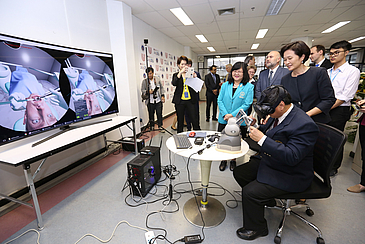The cooperation was established several years ago and has grown with time. There are now a number of projects, in which scientists in Bremen, Bangkok, Groningen (Netherlands), Somerset (UK), Düsseldorf, Oldenburg and Tubingen are working on technical systems.
One example is a project, which using grant funds from the Excellence Initiative began several years ago at the University of Bremen in the frame of a so-called “creative unit”: In said project, international scientists are researching new concepts for the training of surgeons. Cognitive and technical surgical skills can be trained expediently and effectively with the aid of virtual reality simulators. The aim is to shorten the period of surgical training and lower the risk to patients by developing such systems. The researchers are working closely with visceral and dental surgeons in Bremen, Bangkok, Oldenburg and Somerset in the UK.
Fighting Dengue Fever
The fight against dengue fever is the aim of another project. The infectious disease is one of the worldwide most severe viral diseases that is transmitted by mosquitoes. The chances of the disease spreading to Europe are increasing thanks to climate change. Dengue fever is mainly transmitted by the Aedes aegypti mosquito. Said type has adjusted to human habitats and breeds in artificial water containers such as old tires, empty cans or plant pots. Scientists are using geographical information systems and so-called deep learning within the project to enable recognition of dengue-mosquito breeding grounds on Google Street View images. It is possible to create highly detailed density maps of breeding grounds with this technology. Said maps make more specific and expedient containment of dengue fever possible, as they help to foresee the transmission risk and identify regions in which monitoring of water containers is particularly advisable. As the Aedes mosquito is also responsible for the spread of chikungunya, Zika fever and yellow fever, this project may also aid the fight against these diseases.
Bremen Symposium in August
Around 60 international researchers from the fields of medicine, computer science and cognitive sciences from the network will meet in the middle of August in Bremen in order to discuss current research projects and communicate with each other. The “International Symposium on ICT in Medicine and Public Health: Perspectives from AI and Cognitive Science” event, which will be in English, will take place on August 15 and 16, 2019, and is being organized by the Bremen Spatial Cognition Center of the faculty of Mathematics / Computer Science.
Open One Day for the Public
The special feature is that the first day of the symposium, August 15, will be open to the public and will offer the chance for interested parties to learn about and discuss newly developed technologies in the frame of talks and poster presentations. If you wish to register, please do so by August 4, 2019, by sending an email to: kranzprotect me ?!uni-bremenprotect me ?!.de
Further information:
Symposium: https://sites.google.com/view/international-symposium-on-ict/home
Bremen Spatial Cognition Center: https://bscc.spatial-cognition.de/
www.uni-bremen.de/en
Contact:
Holger Schultheis
Bremen Spatial Cognition Center
Faculty of Mathematics / Computer Science
University of Bremen
Phone: +49 421 218-64292
Email: schulthprotect me ?!informatik.uni-bremenprotect me ?!.de

